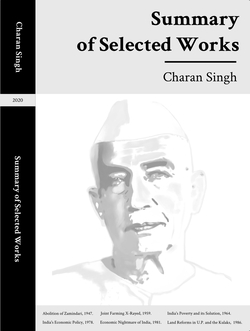Charan Singh was born on 23 December 1902 in Meerut District of the United Provinces (Uttar Pradesh) in an illiterate tenant farmer’s village hut. His mental fortitude and capability were recognised early in life and he went on to acquire a B.Sc., M.A. in History and LL. B from Agra College. He joined the Indian National Congress, at 27, in the struggle to free India from British rule and was imprisoned in 1930, 1940, and 1942 for his participation in the national movement. He remained a member of the Legislative Assembly of Uttar Pradesh from 1936 to 1974 and was a minister in all Congress governments from 1946 to 1967, which provided him a reputation as an efficient, incorruptible and clear- headed administrator. Singh was the state’s first non- Congress Chief Minister in 1967 and again in 1970, before his tenure in 1977-78 as the Union Minister for Home and, later, Finance. This journey culminated in 1979 when he became Prime Minister of India. Over much of the 70s and early 80s he remained a figure of major political significance in Indian politics till he passed away on 29 May 1987.
Charan Singh wrote scores of books, political pamphlets, manifestoes and hundreds of articles on the centrality of the village and agriculture in India’s political economy. Many of these thoughts are relevant to India today as we struggle with an agrarian crisis with 67% of our impoverished population living in the villages and 47% engaged in unremunerative agricultural livelihoods. He helped write the 611 – page report of the Zamindari Abolition and Land Reforms Committee in Uttar Pradesh in 1948 and also wrote the books Abolition of Zamindari (1947), Joint Farming X-Rayed (1959), India’s Poverty and Its Solution (1964), India’s Economic Policy (1978) Economic Nightmare of India (1981) and Land Reforms in U.P. and the Kulaks (1986).


